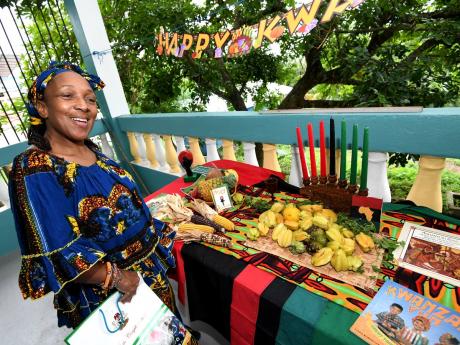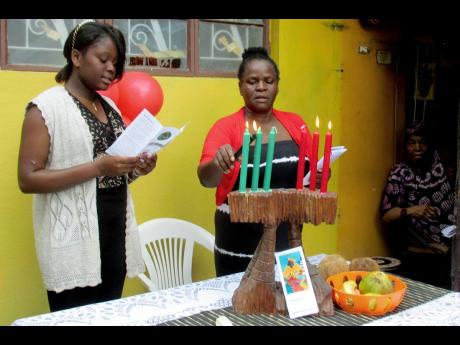Kwanzaa thriving in America, hard sell in Jamaica
For centuries, the gospel of the divine, virgin birth of Jesus Christ in Bethlehem of Judea, His life in Nazareth, His crucifixion and resurrection at Calvary, and His redemptive message have been deeply entrenched in the hearts of millions who regard Him as the Messiah, the Son of the living God, sent by God Himself to save the world from sin.
Though the story is set in the Middle East and parts of north Africa, Egypt especially, its message of an everlasting life with God in Heaven after death is very captivating and well sold by Christians, followers of Christ. It has pervaded almost every nook and cranny on Earth, and Christianity is one of the world’s largest religions, with Christmas being its holiest seasons, followed by Easter.
However, there are millions of people who do not find anything meaningful about Christmas. It does not sufficiently answer, if any at all, their questions about their existence and salvation. The entire Jesus story and its messianic element is not part of their religiosity, spirituality, and cultural sensibilities. They cannot relate to it in any way or form. Yet, Christianity is still a very powerful movement.
But this power, despite its universal impact, has not swayed, grasped, or grabbed some people in the African diaspora. One such person was civil rights activist and black nationalist Maulana Karenga, a professor and then department chair at California State University, Long Beach. In December 1966, Karenga decided to live his own truth and beliefs in a country where Christianity is deeply rooted. He came up with Kwanzaa, also spelt Kwanza, which many people regard as a wholesale rejection of the Euro-centric nature of the Christmas story, at the centre of which there is a white messiah.
INSPIRED BY RACIAL TENSION
Kwanzaa started out as a cultural and not a religious holiday. “The celebration of Kwanzaa is about embracing ethical principles and values so the goodness of the world can be shared and enjoyed by us and everyone,” Karenga had said. The idea resonated loudly with African-Americans for whom it was mainly established to reconnect with their ancestral roots and heritage.
That was why an African word was selected for the holiday’s name. It is pronounced ‘Kwahn-zuh’ and originated from a Swahili phrase, ‘Matundayazwanza’, which means ‘firstfruits of the harvest’. It was inspired by racial tension and conflicts of the mid-1960s in Los Angeles, following the 1965 Watts Riots, when a young African-American was pulled over on suspicions of drunk driving, resulting in an outbreak of violence.
It is a time of feasting, sharing, and reflection, not to observe the birth of an African deity, though it is widely regarded as ‘black people Christmas’. But, it is not. Christmas is about the birth of Jesus Christ. Kwanzaa is not. Nor is it a replacement for Christmas. It lasts from December 26 to January 1. And for 55 years, Kwanzaa has been embedded in the psyche of millions of people in the African diaspora, especially in America, where it is a big holiday for many African-Americans, and others in the diaspora.
In a December 26, 2020, online commentary entitled ‘ What Kwanzaa Means for Black Americans’, published by Pennsylvania Capital-Star, Frank Dobson, associate dean of students at Vanderbilt University, writes, “Karenga called its creation an act of cultural discovery, which simply meant that he wished to point African-Americans to greater knowledge of their African heritage and past.”
“It is a cultural observance that acknowledged solidarity with the struggles of the past and with one another. Like the black power movements, such as today’s Black Lives Matter movement, it is an affirmation of black folks’ humanity, their contributions to this society and resilience in the face of deadly oppression. Karenga wanted to ‘reaffirm the bonds between us’ (black people) and to counter the damage done by the ‘holocaust of slavery’. Kwanzaa celebrations are a moment of this awareness and reflection,” Dobson also writes.
COMPETING AGAINST CHRISTMAS
Kwanzaa celebrations were introduced to Jamaica by the late Queen Mother Mariamne Samad, pan-Africanist and Garveyite. It would last the entire length of the season, but over the years, the observance of Samad’s Kwanzaa dwindled to just one evening, on January 1. In Jamaica, it is a hard sell, and though Kwanzaa is not a religious concept with the intention of converting people from Christianity, Jamaicans are not keen on embracing it. Despite the efforts of Samad and a few others, Kwanzaa has not caught on in Jamaica as they had hoped.
Christmas is a still a big holiday here, and it does not help that Kwanzaa starts on the 26th, which already is a public holiday. “Kwanzaa will never be popular in Jamaica because the majority of Jamaicans celebrate Christmas, and also, many Jamaicans reject their ties to African identities,” Sophia Walsh-Newman, a performance artiste and teacher of all things black, told The Gleaner recently.
For people who see Kwanzaa as competing against Christmas, Walsh-Newman said, “For me, Kwanzaa does not replace Christmas. Although I do not celebrate Christmas, I think Kwanzaa and Christmas can co-exist for some. However, if you truly live the principles of Kwanzaa on a daily basis, the concept of Christmas will naturally be rejected.”
The concept of Christmas has long been rejected by Walsh-Newman, who said, “The Nguzo Saba are principles [of Kwanzaa] I live every day without apology.” The Nguzo Saba includes Umoja (Unity), Kujichagulia (Self-determination) Ujima (Collective work and responsibility), Ujamaa (Cooperative economics), Nia (Purpose), Kuumba (Creativity), and Imani (Faith).
Walsh-Newman has been celebrating Kwanzaa with her children, family, friends, and community for the past 35 years and has no plan to stop doing so. “As long as I am in Jamaica during Kwanzaa, there will be a celebration,” she declared at a pre-Kwanzaa dinner at her St Ann home last year. But in general, the menu for Christmas dinner this year will be the same as in previous years, no influence or inspiration from the Kwanzaa feast.


